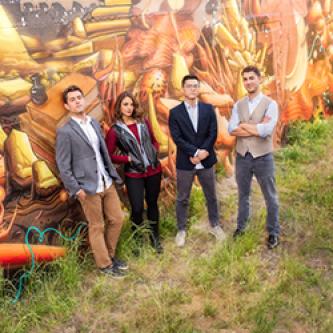
A Conversation with Joel Link, Dover Quartet
By Brittany Worthington, Marketing Student Assistant
Joel Link, violinist for the Dover Quartet, remembers being in the car with his mom, heading home from soccer practice, when she asked him what he wanted to do as he moved through and beyond school. In middle school, Link was heavily involved in sports, but also showed a remarkable affinity for music, one that his parents recognized early on. Even at a young age, his mother’s inquiry marked a turning point for Link, who realized that his parents believed in him enough to support a risky career as a musician. “I think one always begins music because you love it and hopefully that love pervades for the rest of your life.”
That love transformed into a career for Link and the other members of the accomplished and award-winning Dover Quartet. Fate seemed to bring the members of the Quartet together.
Link met fellow violinist Bryan Lee at a music camp when the two were just thirteen years old, not realizing that one day they would be working and playing together in one of the country’s most promising young string quartets. The two entered The Curtis Institute of Music in 2005 where they would eventually met Milena Pajaro-Van De Stadt, viola, and Camden Shaw, cello, who would round out the foursome.
The Quartet’s name comes from the Samuel Barber piece for voice and string quartet, Dover Beach. Barber, who also graduated from the Curtis Institute, and is a Pennsylvania native, provided the Quartet with a way to “root us from where we came from,” said Link.
The September 18 performance at McCullough Theatre that will open the 2017-18 Essential Series Season will be the Quartet’s first performance together in Austin, and they’re excited for the experience. “Everyone talks about Austin like it’s the holy grail of places to go. I hear it’s super hip and there are great places to eat!” Link explained that food is an instant bonding tool amongst musicians who often share their recommendations on where to eat, drink, and make merry during their various tour stops. “It will be fun to see what Austin is all about especially for a first-timer, and I think Austin’s reputation speaks for itself.”
Their program in Austin features works by Mendelssohn, Laks, Ullman, and Schumann, which showcase music’s ability to reveal and transcend human experience during some of life’s most traumatic and joyful moments. Mendelssohn’s compositions followed the untimely death of his beloved older sister, Fanny, while Schumann wrote his Quartet No. 2 for his wife Clara’s birthday, and Laks and Ullman composed their pieces under the shadow of the concentration camps, where Laks died and Ullman was eventually liberated. Link spoke to the tragedy Mendelssohn experienced and described the composer’s view of music as one of “worship.”
For Link, being part of Dover Quartet, and being a musician overall has its frustrations, but also immense fulfillment. “You’re still individual, but part of something bigger...in a quartet there is less room to not bring your A-game. It’s about caring—and the repertoire is so exciting and it’s scary to think that there isn’t a chance to take on every piece I want to play and not spend a year with them. For me music is really just an emotional journey and it surprisingly tells you a lot about yourself.”
The Quartet has a number of ongoing and upcoming projects, including a new album that presents three unique perspectives on war and a documentary that chronicles their time together onstage, offstage, on the road, and even sleeping in airport terminals. Link said the documentary captures the Quartet “laughing, arguing, everything. [The documentary is] not so much about any prizes it might win, but making chamber music accessible, showing that we are people with everyday struggles, not just people who live in suits [and black dresses]."
That idea of accessibility plagues the genre of chamber music in general, especially with younger audiences, but Link encourages being open-minded to the experience. “I think it’s okay to not ‘get it’ and what is amazing about music is not whether or not you know a lot about music. It’s like walking into the Louvre and you’re surrounded by all this amazing art. It doesn’t matter how much you know about art, you can find what is going to resonate for you. People can’t tell you that this is the best piece or this better than that; in fact I think that’s a shallow way of looking at things.”
For Link, the value lies in what can be gleaned emotionally from the “intimacy of seeing four people just having a conversation and the how compelling it is being around this bubble of energy. It pays out in divided in just feeling it and trying to put yourself into it.”
“Music doesn’t judge,” Link continued. Rather, it is an experience open to anyone with a willingness to open their minds and ears, listen, and enjoy the ride.
Dover Quartet
Joy, Escape, Outlet, Gift
McCullough Theatre
Monday, Sep 18, 8 pm











